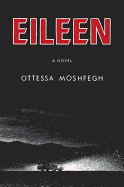
The week before Christmas 1964, in a small New England town she calls "X-ville," 24-year-old Eileen Dunlop's life takes a major turn. As narrated by the character 41 years later, in Ottessa Moshfegh's disturbing novel Eileen, it was not much of a life. Painfully self-conscious and obsessed with her appearance and personal "organic processes," young Eileen works as a low-level clerk at a juvenile boys prison and lives with her widowed father, a retired local cop--abusive, alcoholic and prone to imagine wolves in the backyard.
A Wallace Stegner Fellow and Plimpton Prize-winner, Moshfegh similarly explored the jagged edges of depravity in her 2014 novella McGlue. Eileen wears her dead mother's frumpy clothes, reads National Geographic, shoplifts drugstore notions, binges on laxatives and regularly sips from a pint of vermouth. When chic Harvard graduate Rebecca comes to work at the detention center and befriends her, Eileen latches onto the young woman as her ticket out. The sensible narrative voice of the older Eileen doesn't sugarcoat her dismal youth--rather it makes her peculiar past not just believable but in some ways admirable. When that Christmas week plays out, narrator Eileen looks back with some satisfaction: "What came after this story ends was not a direct line to paradise, but I believe I got on the right road, with all the appropriate trips and kinks." Eileen is an unforgettable character, and Eileen is a haunting novel. As Moshfegh said in a recent interview, "every place needs a few wolves or there would be no stories to tell." --Bruce Jacobs, founding partner, Watermark Books & Cafe, Wichita, Kan.

